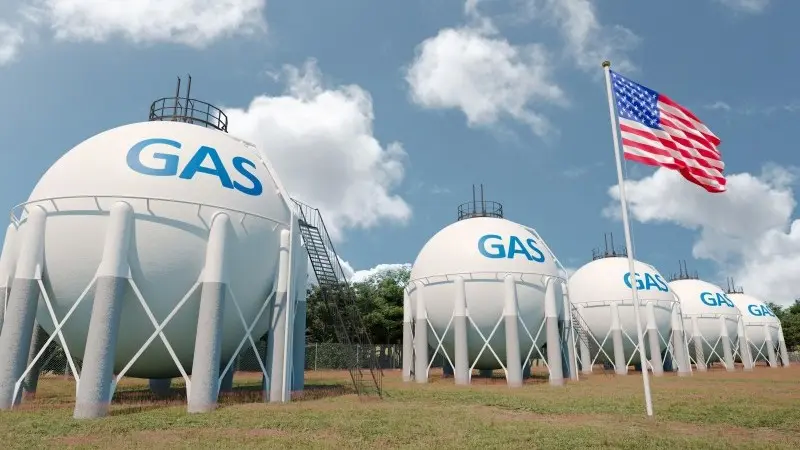
Affected by multiple factors such as weather and inventory, US natural gas futures prices have recently hit a new low in nearly 30 years, putting pressure on major producers to announce production cuts and shift their focus to the export market. However, Qatar announced the expansion of liquefied natural gas production capacity last weekend, which may trigger more intense market competition, indicating that a new round of risks is brewing.
The main reason for the decline in natural gas prices in the United States is the impact of warm winters, resulting in lower than expected local heating demand. According to data provider Luft, quoted by Reuters, the number of heating days in 48 states in the United States over the next two weeks is 341, far below the average level of 405 in the same period in previous years. The number of heating days is estimated by calculating the number of days when the daily average temperature is below 18 ℃ to estimate the heating demand of households and businesses. The larger the value, the higher the heating demand.
The warm winter weather and declining demand have led to an increase in natural gas inventories in the United States. According to EIA data, in January 2023, natural gas extracted from inventory accounted for only 55%, or 371 billion cubic feet per day, which is lower than the average level of the previous five years. At the same time, natural gas production in the United States has increased by 11% compared to the average level in the previous five years.
Analysts warn that unless prices are low enough to stimulate production cuts and attract power plants to switch to natural gas, domestic storage capacity may face the risk of filling up later this year. Palmer, Executive Director of S&P Global Commodity Insight, said that the second consecutive mild winter has caused coal to accumulate in power plants, which means coal prices have fallen and natural gas must be cheaper than last year to persuade power producers to switch raw materials.
In the competition between oil and natural gas, natural gas producers have become losers. Some companies are closing oil wells, canceling projects, or selling themselves to competitors to avoid losses. The price of natural gas fell to $1.59 per thousand cubic feet this month, which benefited fuel consumers such as utility companies, but hurt producers selling at nominal prices as low as those at the height of the COVID-19 epidemic.
Low cost natural gas has put many businesses in a predicament. The most obvious one is BKV Corp, headquartered in Denver. In the past five years, the company has spent $2.7 billion to acquire 4000 gas wells and two gas power plants, and has promised to spend $250 million to build more than ten underground carbon capture and storage facilities. However, the sharp drop in US natural gas prices has hindered BKV's initial public offering plan and disrupted its carbon joint venture with Verde CO2 to combine its natural gas and power plants with carbon sequestration.
Qatar's increase in natural gas production poses greater challenges for the United States. While the United States is considering expanding its overseas markets, Qatar also sees opportunities. Qatar Energy CEO Saka Abi announced last Sunday that it will expand its liquefied natural gas production to a total annual capacity of 142 million tons.
Prior to this, Qatar Energy Company had signed a series of supply agreements with partners in Europe and Asia for its North Field expansion project in the northern oil field. Saka Abi revealed, "It's difficult to give a figure for the expansion cost now, but it will definitely reach billions. We will start preliminary engineering research on the project and announce the project plan at the appropriate time."
It should be noted that this increase in production may not be the last for Qatar, the Gulf energy giant. Saka Abi stated that it will continue to evaluate Qatar's natural gas inventories and further release production capacity if necessary. Given the uncertainty of the global energy demand outlook, competition for market share may exacerbate the volatility of the global natural gas market, bringing an impact to the struggling US market.

The 2025 US holiday shopping season was supposed to be a double celebration for both merchants and consumers. However, the reality is shrouded in a "bill chill."
The 2025 US holiday shopping season was supposed to be a do…
On November 5th, the US federal government entered its 36th…
JPMorgan Chase CEO Jamie Dimon recently made important asse…
When the US Senate passed a resolution with 51 votes in fav…
Recently, according to Teslarati, Tesla announced that the …
Nikkei Group, the Japanese business information giant that …